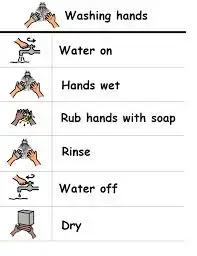For some of us, it's really hard to feel our body's signals, like hunger, thirst, and even the pressure that lets us know when to go potty. The ability to feel these things is called
"interoception." Not being able to tell when you need to potty can result in some, uh, drama.
 Fragile neurology combined with strong sensory sensitivities leads to shutdowns
Fragile neurology combined with strong sensory sensitivities leads to shutdowns, such that we don't have a clear grasp of how our day is supposed to go. Did I eat today? Did I pee? Did I drink any water today?

We can get that fogged-out.
Executive functioning challenges means the planning, self-monitoring (ability to remain aware enough of what you are doing, as you are doing it) doesn't always happen. So tasks which require a sequence of steps don't always happen. (Ex: Walk to restroom, close door, pull down pants, etc.) In fact, just
initiating the confusing sequence when you're shutdown can be so confusing, tasks never happen. Not going to the bathroom, not making a sandwich..
too many steps for an overwhelmed brain in energy-save mode.
For some, the experience might feel like this: Even if the person's potty trained, he/she may go about the day, not able to feel the body's signals. Stress in his/her life overwhelms their neurology, and their awareness becomes minimal at the same time that complex sequential tasks become "too much." Eventually, the person's going to have to "go." He/she may feel distressed and not know why! He/she must then think: "Okay, did I eat today? (maybe I'm hungry) Did I drink today? (am I thirsty?)" and so on. He/she might be in pain and not recognize it. Ultimately, sometimes the only answer to feelings of mysterious distress is to try to eat a little, go potty, drink a little, and take some aspirin. Cover all bases!

The challenge is to initiate the sequences (executive dysfunction) to get the drink, go potty, get food, find the aspirin, when deeply brain-fogged. Whew!

What helps?
1. Picture schedules! Yay! Many of us love routines and structure. These are great for when life gets hairy, and boy do they streamline getting the essentials attended to.
View attachment 21873
You can even put picture schedules in the bathroom...
View attachment 21875
Sometimes in young kids, it's dyspraxia, a co-ordination and muscle-control development issue. Autistic kids develop at their own speed, and some who may not be potty trained by 3, will be by 13. Or 23! We've got our own timetable. Patience helps. The most important thing is not mindlessly pushing skills, but respectfully listening to the child communicating his/her needs and feelings in whatever way communication is possible. Sensory issues may be the concern, and some of them could possibly be remedied.
Autistic adults can have times when functioning is better than others regarding interoception, awareness, and executive functioning. Ultimately, some of us simply strut our stuff when we're doing things as hoped for, and when there's a bit of drama, we learn to just deal with it, laugh about it, and get on with our life's adventures.
 View attachment 21877
View attachment 21877
